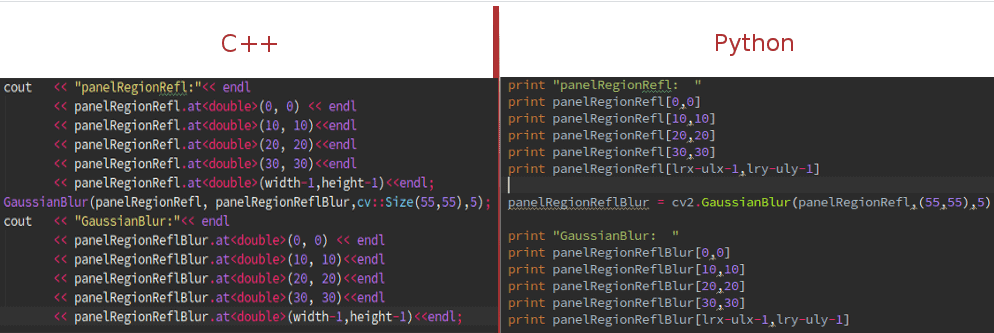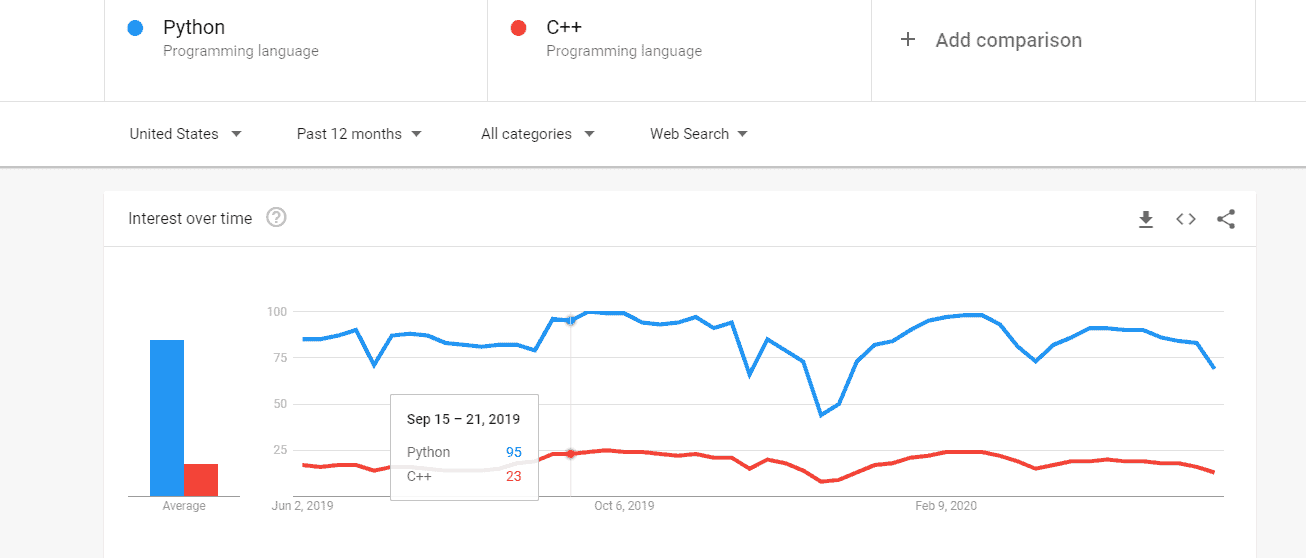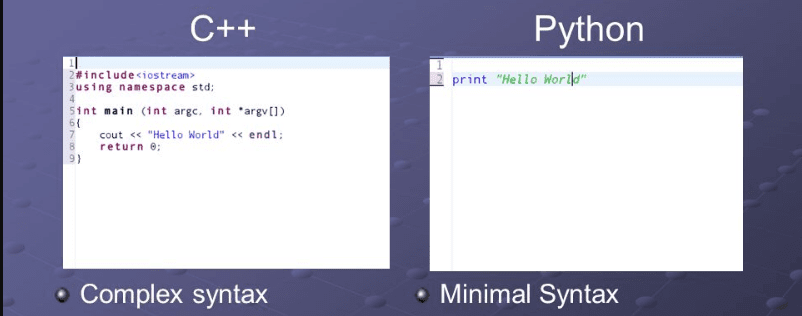Quick Summary :- There is no doubt in it that the plethora of available programming languages makes it quite confounding for developers in deciding which one to choose. If we talk about Python and C++, both are remarkably superior, triumphant, and extensively-adopted general-purpose programming languages. Here, we discuss their features, pros & cons, and their uses for you to decide which is the best.
Amidst an overabundance of programming languages, Python vs C++ has been involved in an age-old infinite debate since their inception and may continue till eternity or until we reach a definite judgment.
Both Python and C++ are remarkably superior, triumphant, and extensively-adopted general-purpose programming languages and these programming languages have a lot of features in common accompanied by a host of contrasts.
Python is acknowledged as a novice-favourable high-level language and that’s why Python is most suited for AI, data analytics and ML. C++, in contradiction, is a low-level language that is commercial-friendly, a must-have for numerous complex projects like game development
Unquestionably, the languages under the limelight and in the debate have their own set of pros and cons, but what matters is, who outnumbers whom in the pros and cons.
Our Adept Engineers have shared their key insights in this article putting light on the specialties of Python and C++. The “vs” in Python vs C++ stands for comparison and not a competition.
Overview of programming languages: Python vs C++

What Is Python?
Python was conceptualized and devised by Dutch Programmer Guiddo van Rossum in 1991 stressing on code readability and its versatile usage. It is an universally accepted language for application development and is accessible on all cross-platform operating systems.
From a debate standpoint, Python has a very simplistic and minimalistic feature that can tackle common programming tasks and its pseudo-code enables one to meditate on the resolution to the query and not on the language. That’s why today there is a massive demand to hire python developers.

What Is C++?
“C with classes”- C++ was manifested as an offshoot upgrade of the C language by Bjarne Stroustrup in the year 1979 as a general-purpose object-oriented programming language.
The main purpose behind its debut was the execution of object-oriented programming in the C language, as a codified language making it prominently agile.
From the lens of debate, C++ may not be favourable for novices, nevertheless, it offers a remarkably extensible programming language which furnishes the programmer with some substantial authority over other languages in the world of programming.
What Python Is Used For?
- Python in Machine Learning can be a phenomenon towards diverse enterprises and business co-operations as ML serves to capture explicit purpose-oriented insights to make business forecasts.
- Python is the most winning pick among data-analysts as their core programming language. Python champions the artwork of handling boundless capacities of data cost-effectively.
- Python is a wondrous active participant in web development. Take Django for that case. This framework encourages you to employ Python in web development.
- You can additionally build a website using Python alone and undiluted, but that is extremely uncommon and rare.
- Even though Python code cannot be adopted in the frontend development, some tools can surely assist to transpile Python code to JS (that operates on the browser).
What C++ Is Used For?
- Being adjacent to the hardware, C++ unfolds most of the embedded systems encompassing it. For example, smartwatches, medical instruments, IoT sensors, etc.
- C++ performs a pivotal part in the improvement of intricate applications like servers and microcontroller programs.
- C++ is the primary dominant language for game development like 3D, multiplayer, and countless others. It is exceedingly sturdy to formulate such detailed and extravagant games like Counter-Strike, Red Dead Redemption, and Doom.
Why Python?
- It has an extremely simplistic syntax compared to C++ and other languages like C and Java.
- Both Machine Learning and Deep Learning are the choicest fit with Python along with the customary overarching AI field.
- Comprehensive library and ingenious tools for developers/programmers.
- Python is moderately easy to write and debug when correlated to other languages that make it extra smooth to sustain its source code.
- Python is a compact language that can work on an all-inclusive assortment of Operating systems and platforms.
- Python incorporates ready-assimilated libraries that aids in effortless development.
- Complex programming is forthwith more oversimplified with Python because it trades with memory addresses internally with garbage collection.
- Database interfaces are stretched to all the influential commercial DBMS systems.
- Shoulders crucial and functional programming.
Why C++?
- C++ is tri-paradigm – following Generic, Imperative, and Object-Oriented.
- C++ delivers high-level performance and efficient memory.
- It offers high-level abstraction.
- C++ is an offshoot of C and hence is C-compatible.
- Reusability of code is possible in C++.
- C++ facilitates you to encapsulate high and low-level language features.
Features of Python

- It is Convenient to read, interpret, and maintain.
- It can work on varied hardware platforms employing the very interface.
- Low-level modules can be incorporated effortlessly to the Python interpreter.
- Python proposes a unique composition and assistance for extensive utilisation.
- Python also expands assistance for computer-aided garbage collection.
- It has an interactive technique of testing and debugging.
- It delivers high-level dynamic data types and also favours dynamic type checking.
- Python language can be coupled with other programming codes like C++, C, and Java.
Features of C++

- They are appealingly simplistic, comfortable to follow, and object-oriented.
- It has a robust and protected setting for development.
- Portable code with Specific architecture is present.
- Dynamic Memory Allocation makes code “interpreted and dynamic” easily.
Pros and Cons of Python
Pros
- Simplistic and easy-to-follow syntax even for Novices
- Object-Oriented Programming-driven
- Backs crucial and functional programming
- Boundless library
- Supports cross-platforms and systems
- Python is readily extensible with C/C++/Java code
- Open Source and extensive and powerful community backing
Cons
- Confined application in platforms
- Low mobile computing potential, hence not exercised in app development
- As Python is dynamic, it exhibits higher errors at run-time
- Restrictions in admittance due to under-developed and primitive database
- No commercial support and not the first pick for memory-intensive tasks
Pros and Cons of C++
Pros
- Highly object-oriented with concepts like classes, polymorphism, encapsulation, etc.
- Offers platform freedom and portability.
- Low-level language like Assembly language on Machine language called portable.
- C++ programming is multi-paradigm (pertaining to the technique of programming).
- It is serviceable for the low-level programming language and highly valuable for general purpose.
- C++ empowers with comprehensive authority covering memory management.
- It renders a top-level abstraction.
Cons
- No security furnished for your code’s defence.
- Usage of complex language in a high-level program.
- Generally employed in platform-specific applications.
- When C++ is used for web applications, it is intricate and challenging to debug.
- Garbage collection unavailable.
- Nonexistence of in-stacked threads.
Applications of Python

- Practised in Machine learning
- Simple and Cost-effective bulk data management
- Python is the ablest pick of Data analysts for data analysis and statistical information
- Extensively applied by web-developers in the development of complicated web applications
Applications of C++
- All embedded systems can be formulated with C++. For instance, smartwatches, multimedia in motors, loT devices, etc.
- C++ also enables server development and superior-performance microcontroller programs.
- C++ is the core of Game development. Hence there is tremendous popularity of C++ among game developers.
C++ vs Python: Comparison Table
|
Python |
C++ |
|---|---|
| Garbage Collection Present | Absence of Garbage Collection |
| Easy to Learn and write | Complex Syntax makes learning difficult |
| Runs via interpreters | C++ is pre-compiled. No interpreter Needed |
| Small Code Size making Rapid Prototyping Possible | Large Code Size making Rapid Prototyping impossible |
| Beginner-Friendly | Not for Beginners |
| English language, Easy for Humans | C Language, Easy for Machines |
| Python is much slower in performance. | C++ is faster in performance |
| High Readability | Weak Readability |
| Stands 2nd in Popularity Worldwide | Stands 3rd in Popularity Worldwide |
| Used by companies like Google, Netflix, Instagram, Dropbox, etc. | Used by companies like Google, Accenture, Twitch, Pubu, etc. |
| The average salary for a Python Developer is $120,359 per year in the United States of America. | The average salary for a C++ Developer is $108,809 per year in the United States of America. |
Analyzing The Difference Between Python and C++
Criterion #1: Syntax

Python
In terms of Syntax, Python depends on indentation and has a friendly approach with a generous measure of whitespace for easily readable code.
Even in Boolean expressions basics, Python has more feasibilities than just a mere True and False.
C++
Unlike Python, C++ has a more complicated syntax as its code requires curly brackets and semicolons.
C++ also has limited flexibility as it returns either false or true grounded on numeric values in Boolean expressions.
eSparkBiz RecommendationPython wins this battle of Python vs C++ because of its simple syntax whereas C++ has more complicated rules and principles.
Criterion #2: Performance
Python
Performance-wise, Python is a dynamic language and interpreted language that optimizes programmer efficiency and reduces speed.
C++
C++ has the edge of being a statically typed and compiled language that helps in more agile execution generating more time-effective programs.
eSparkBiz RecommendationC++ wins this race of Python vs C++ for building an extra compact and more accelerated runtime code.
Criterion #3: Game Development
Python
Python can lend a helping hand when it comes to game development, but it is for amateurs. Python’s weak performance issue is a concern for creating a fast and rich-featured complex game. However, with the help of Python Performance Tips, you can overcome that issue.
C++
C++ is the pre-eminent language for game development. It is extremely efficacious and robust to create such extravagant and extensive detail-oriented games with hard-core graphics creation.
eSparkBiz RecommendationC++ is at the apex of the ladder in this game of Python vs C++.
Criterion #4: Compilation vs Virtual Machine
Python
Python runs every time you execute a program. It compiles the source like C++ compiler, however, Python needs an interpreter to compile.

C++
C++ is pre-compiled and it doesn’t demand any interpreter throughout the compilation.

eSparkBiz RecommendationC++ stands out as a clear winner in this game of C++ vs Python.
Criterion #5: Static vs Dynamic Typing
Python
Python falls under the category of dynamic typing or duck typing, which is incredibly robust and offers you colossal flexibility and grants any type to be practised that meets the claimed interfaces.
C++
C++ is statically typed, indicating a distinct data type for every variable you utilise in your code. However, only values of the suitable type can be assigned to a variable unless you skip some hoops.
eSparkBiz RecommendationPython wins C++ vs Python race for this point as it offers more flexibility and is easier to
Criterion #6: Object-Oriented Programming
Python
While both are object-oriented, in Python, everything, from class member and method in a class object is public that makes encapsulation much more ineffective and provides more limited assistance.
C++
C++ yields extensive object-oriented functionalities like the concept of classes, multiple inheritances, operator overloading, virtual functions, exception handling etc.
eSparkBiz RecommendationC++ is winning hearts in this field since its inception in the race of C++ vs Python.
Criterion #7: Memory Management
Python

Python offers a secure and trusted memory management and it is not direct. Instead, it offers integrated, dynamic, and automatically-programmed memory management termed as a garbage collector.
C++
C++ does not have any garbage-collector feature, and therefore manages memory manually.
C++ also employs pointers which makes it prone to memory leakage.
eSparkBiz RecommendationPython in Python or C++ battle because of its garbage collection attributes wins the race.
Criterion #8: Threading, Multiprocessing, and Async IO
Python
Python has a simplified threading implementation. Even the Async IO code in Python is single-threaded and hence, light-weighted, making a quicker spin of bulk volume to handle I/O bound problems.
Python’s multiprocessing support is formed into the standard library with a neatly organized and clean interface allowing to create a pool of processes. This is a major Difference Between Python and C++.
C++
In C++, threading takes complete advantage of the cores on a multiprocessor system and gives a general speed-up for both computationally bound and I/O bound problems.
C++ employs individual threads that permits the C++ Async IO code to execute faster on computationally bound queries.
eSparkBiz RecommendationPython, for its ease of use and simplicity.
Criterion #9: Usage
Python
Writing code in Python is easier because of the language it uses and because of a lesser number of lines. So, this is a Difference Between C++ and Python
C++
C++ has a complex language and it is not easy to write code due to the complex syntax.
eSparkBiz RecommendationWithout a doubt, Python.
Criterion #10: Salary
Python
The average estimated salary of dedicated Python Developers in the USA is around $110,958 annually.
C++
C++ developers earn an annual remuneration of close to $71,677 in the USA.
eSparkBiz RecommendationC++ does the maths!
Criterion #11: Rapid Prototyping
Python
Rapid Prototyping is possible in Python owing to its code’s small size that leads to faster results as well.
C++
C++ has a larger code size, therefore rapid prototyping is not feasible hence rate of program result is low.
eSparkBiz RecommendationPython, because its program result comes in shorter length than C++.
Criterion #12: Popularity
Python
A survey with over 2,000+ data scientists and machine learning developers conducted by Developer Economics indicates that around 57% of survey respondents were utilising Python, while 33% prioritised it for development
C++
C++ stands next in the list with 44% practising it, and only 19% prioritising it for machine learning development.
eSparkBiz RecommendationSo, when you compare C++ and Python in terms of popularity, Python is more popular than C++.
Criterion #13: Simplicity
Python
Python is the celebrated language for its ease-of-learning, use and simplicity –especially with the learners.
C++
C++ is a relatively lower-level language, which is easier to read but for the computers (which accounts for its high performance), and for humans, it is way too hard.
eSparkBiz RecommendationPython.
Criterion #14: Speed
Python
For an industry level commercial software, speed is extremely vital – especially for real-time software and time-sensitive entities. Python is written in C (the predecessor of C++). which makes it slow.
C++
In C++ vs Python Speed, C++ is many times faster than Python. The faster the language is, the more efficient it is.
eSparkBiz RecommendationC++ wins the race of Python vs C++ Speed.
Also Read: Python vs C# : Genuine Opinion By Our Experts To Choose The Best Technology
Companies using C++
- Twitch
- Accenture
- Yext
- FiveStars
- Pubu
- Yummly
- QuizUp
- Animoto
- Mediamath
Companies using Python
- Spotify
- Netflix
- Uber
- lyft
- Dropbox
- Instacart
Conclusion
While we do not decide or favour which is the ‘better’ language among the two, Python is undisputedly easier to learn and a go-to language. A clear winner for beginners. But, when it is about game development and performance, C++ is the winner.
Why not check out Cython – the horsepower of Python with the elements of C++ to get the best of both realms. Sounds fun? Try it.
And that’s a wrap.
Frequently Asked Questions
Python vs C++: Which Is Better?
There can not be a fixed answer for this type of question. Both languages have their strengths and weaknesses. However, when it comes to speed and performance, Python edges ahead of C++.
Is C++ More Powerful Than Python?
The simple answer to this question would be YES. Python is a powerful language. The major reason behind that is, code is simpler & easy to write. But, if you look at the overall picture, C++ out surges Python.
Which Language To Learn First: Python or C++?
If you ask the experts, then they will surely tell you about learning C++ first. The reason behind that is it will allow you to get familiar with OOP concepts. That will be a good foundation stone for Python later on.
Can I Learn Python Without Knowing C++?
The simple answer to this question would be NO. You need to have a basic knowledge of OOP concepts before dealing with Python.
Why Has Python Become Popular In A Short Time?
The main reason for the popularity of Python is its high productivity and efficiency. The code reusability and easy syntax allow you to create applications in a limited time period.
Can I Learn Python In A Month?
YES, you can learn the Python programming language within one month. But, that will be the basics only. For advanced programming, you need to give more time as well as effort.


